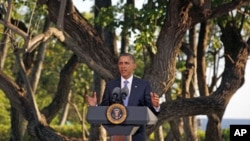U.S. President Barack Obama has closed the summit in his home state of Hawaii of the 21 member Asia-Pacific Economic Cooperation (APEC) group. APEC agreed on steps aimed at boosting growth and simplifying trade. Mr. Obama also discussed bilateral issues with China and Iran's controversial nuclear program.
A U.S. statement said leaders agreed on a comprehensive set of measures designed to increase growth, create jobs and expand trade and investment in a region representing more than half of the world's economic output and 44 percent of world trade.
APEC commits to enhance market-driven innovation policies, reduce or eliminate tariffs and other barriers to trade in environmental goods and services, and take steps to help businesses through regulatory reforms.
Related video report by Mike O'Sullivan
President Obama again drew a link between the U.S. economic recovery and the Pacific, saying the region is the key to America's future.
"Ninety-five percent of the world's consumers are beyond our borders. I want them to be buying goods with three word stamped on them: Made in America. So I have been doing everything I can to make sure that the U.S. is competing aggressively for the jobs and the markets of the future," Mr. Obama said.
Other decisions include steps to ease travel, reduce tariffs on so-called environmental goods and services, encourage so-called "green" jobs, and phase out inefficient fossil fuel subsidies.
With China objecting, the United States and eight other APEC economies committed in Honolulu to finalize a new free trade zone called the Trans-Pacific Partnership by next year.
The summit came amid ongoing global anxiety about Europe's ability to resolve the debt crisis affecting such nations as Greece and Italy.
Mr. Obama said the ultimate goal for APEC is to create a "seamless regional economy," saying the U.S. needs to be an aggressive competitor in the region. "If we are not playing out here in the world's largest regional economy and the world's fastest ((growing)) regional economy, if we have abandoned the field and we are not engaged, American businesses will lose out and those jobs won't be in the United States of America," he said.
Mr. Obama again called on China to change policies he said disadvantage the U.S. and other trading partners, allow further appreciation of its currency and move toward a more domestic demand-oriented economy.
He also faced questions about the recent International Atomic Energy Agency (IAEA) report that provided evidence of secret Iranian nuclear weapons development efforts.
The U.S., China and Russia, Mr. Obama said, are united on this major objective.
"All three of us entirely agree on the objective, which is making sure that Iran does not weaponize nuclear power and that we don't trigger a nuclear arms race in the region. That is in the interests of all of us," Obama said.
Mr. Obama said they will be consulting closely in coming weeks on other "available options" building on existing sanctions. He said the U.S. takes no options off the table but will pursue "every avenue" for a negotiated solution.
The president also used the news conference to urge Democrats and Republicans on a special U.S. deficit committee to "move off rigid positions" and reach an agreement by November 23rd on at least $1.2 trillion in deficit reductions.
He said he hopes they will "do what needs to be done," adding he is prepared to sign balanced fair legislation that spreads sacrifice, including asking the wealthiest Americans to pay a bit more to help address U.S. deficit problems.





